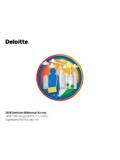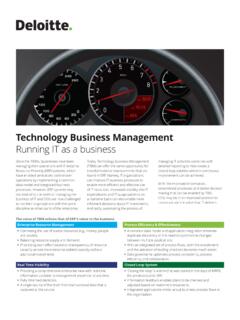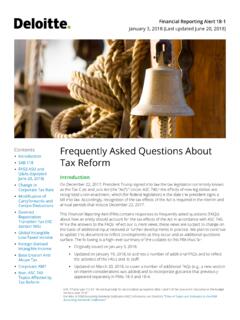Transcription of United Investment basics - Deloitte
1 International Core of Excellence 2016 69per annum per business/group of companies incurred as from 1 January 2016 (GBP 500,000 for the period 1 April 2014 - 31 December 2015).There is a limit on deductions that can be taken for financing costs where UK companies are members of a large group (as defined). These debt cap rules broadly apply where the aggregate tax deductions for net financing costs of UK group companies exceed the worldwide group s gross accounting financing of dividendsA dividend exemption applies to most dividends and distributions unless received by a bank, insurance company or other financial trader. Dividends received by a non-small UK company on most ordinary shares and many dividends on nonordinary shares from another company (UK or foreign) are exempt from UK corporation tax, with no minimum ownership period or minimum ownership level.
2 The exemption also can apply to small companies receiving dividends and distributions from UK companies or foreign companies resident in a jurisdiction that has concluded a tax treaty with the UK which includes a nondiscrimination provision. (A small company is a micro or small enterprise , as defined by the EU).Capital gainsCapital gains form part of a company s taxable profits. Gains or losses on the disposal of substantial shareholdings in both UK and foreign companies can be exempt. The main conditions, broadly, require the selling company to have continuously owned at least 10% of the shares of the company being sold for at least 12 of the 24 months before disposal and the selling company/company being sold both must be trading or members of a trading group (without, to a substantial extent, any nontrading activities) for at least 12 months before disposal (24 months in some cases) and Corporate taxation ResidenceA company is UK resident if it is incorporated in the UK or its place of central management and control is in the UK resident company is subject to corporation tax on worldwide profits and gains (see Taxable income, below), with credit given for overseas taxes paid.
3 Foreign profits and losses (including those from certain capital assets) arising from a permanent establishment (PE) of a UK resident company may be excluded by making an irrevocable election. The effect of the election may be deferred where the PE has incurred a loss. Anti-diversion rules based on the CFC rules (see Controlled foreign companies, below) may restrict the profits that can be excluded from the charge to UK tax by virtue of the election. A nonresident company is subject to tax only in respect of UK-source profits, which include the income of a UK PE of the nonresident, income and certain gains from UK real estate, certain UK-source interest income and gains on assets used for the purposes of a PE s incomeFor a UK resident company, corporation tax is imposed on trading income, several baskets of nontrading income and capital gains.
4 Normal business expenses may be deducted in computing taxable income, provided these are not capital expenditure. No deduction is available for the depreciation or amortization of land, buildings or other tangible fixed assets. Instead, tax relief is available for qualifying capital expenditure on plant and machinery (including certain integral features in buildings) at an annual writing-down allowance of 8%/18% on a reducing-balance basis, depending on the type of asset. Full relief is available for the first GBP 200,000 of expenditure (excluding automobiles) United KingdomAnne-Mari DavidsonDirector Tel: +1 718 508 6153 MilesSenior Manager Tel: +1 212 492 basicsCurrency Pound Sterling (GBP) Foreign exchange control NoAccounting principles/financial statements UK GAAP/IAS. Financial statements must be filed business entities These are the public and private limited liability company, limited liability partnership, limited partnership, partnership, real estate Investment trust (REIT) and branch of a foreign after the disposal.
5 When an election has been made to exclude the profits of PEs (see Basis, above), the exclusion also may apply to gains and losses of certain capital assets of the PE. A nonresident company generally is not subject to tax on its capital gains unless the asset is held through a UK PE or, in certain cases, where UK residential property is annual tax on enveloped dwellings (ATED)-related capital gains tax applies to both UK resident and nonresident companies and certain other vehicles disposing of UK residential property valued at more than GBP 1 million (GBP 500,000 as from 1 April 2016). Exemptions from this charge are available in various circumstances. All gains on the disposal of UK residential property held by nonresident individuals, trustees, partners, some funds and narrowly-held companies are taxed as from 6 April losses generally can offset total profits of the year (including capital gains), with carryback of the excess to the preceding year permitted.
6 Trading losses may be carried forward indefinitely unless there is a change of ownership of the company and a major change in the nature and conduct of the trade within three years, but can be offset only against trading income. Capital losses may be offset only against capital gains and only may be carried main rate of corporation tax is 20% as from 1 April 2015 (reduced from 21%). The main rate does not apply to ring fence profits from oil rights and 25% rate applies as from 1 April 2015 where multinational companies use artificial arrangements to divert profits overseas to avoid UK 28% rate applies to gains that arise on disposal of UK residential property where the gain is ATED-related (see Capital gains, above).SurtaxNoAlternative minimum taxNoForeign tax creditA UK resident company is subject to corporation tax on its worldwide profits (including capital gains), with credit given for most overseas taxes paid.
7 As noted above (see Basis, above), a UK company may elect to exempt the profits and losses of foreign PEs from UK corporation tax, provided certain conditions are satisfied. Where such profits are excluded from UK taxation, no credit is exemptionMost dividends, including foreign dividends, are exempt (see Taxation of dividends, above). In addition, capital gains on the disposal of substantial ( 10% or more) shareholdings in certain companies are not subject to corporation tax (see Capital gains, above).Holding company regimeSee Participation exemption, enhanced tax deduction of 230% is available for certain R&D expenditure as from 1 April 2015 for small or medium-sized companies; the deduction is 130% for large companies. Alternatively, large companies may claim an above the line R&D credit at a rate of 11%.
8 The above the line credit will become mandatory as from 1 April patent box regime allows companies to elect to apply a preferential rate of corporation tax to all profits attributable to qualifying patents. As a consequence of the OECD s initiative on base erosion and profit shifting (BEPS), the current regime will be closed to new entrants as from July 2016 and a new regime will be introduced. There also are creative industry tax reliefs of up to an additional 100% deduction for qualifying expenditure on film production, animation, video gaming, high end television broadcasts (including children s television programs) and theatrical productions. As from 1 April 2016, tax relief at 25% will be available to Core of Excellence 2016 71 UKWithholding taxDividendsThere typically is no withholding tax on dividends paid by UK companies under domestic law, although a 20% withholding tax generally applies to distributions paid by a REIT from its tax-exempt rental profits (subject to relief under a tax treaty).
9 InterestInterest paid to a nonresident is subject to 20% withholding tax, unless the rate is reduced under a tax treaty or the interest is exempt under the EU interest and royalties directive. A reduction of the withholding tax rate under a tax treaty is not automatic; advance clearance must be granted by the UK tax paid to a nonresident are subject to 20% withholding tax, unless the rate is reduced under a tax treaty or the royalties are exempt under the EU interest and royalties directive. Advance clearance is not required to apply a reduced treaty service feesNoBranch remittance taxNoOther taxes on corporationsCapital dutyNoPayroll taxNoReal property taxThe national nondomestic rate is payable by occupiers of business premises. Local authorities collect the tax by charging a uniform business rate, which is deductible in computing income subject to corporation tax.
10 Council tax applies to the occupation of domestic securityEmployers are required to make earnings-related social security contributions, together with employee payroll deductions (see Other taxes on individuals below).Stamp dutyStamp duty at applies on the transfer of UK shares and is payable by the duty land tax (SDLT) is charged on transfers of UK real property. Land and buildings transaction tax (LBTT) is charged instead of SDLT on Scottish residential property, SDLT rates are between 0% and 12% (increasing to 15% as from 1 April 2016 for certain property), depending on the value of the property. The rates for nonresidential property are 0% to 4%. A 15% rate applies to purchases of residential property valued at more than GBP 500,000 by companies and certain other vehicles, though relief from the 15% rate is available for some certain circumstances, transfers within a tax group may be free from stamp taxSee Stamp duty ATED is an annual tax charge that applies where companies and certain other entities own UK residential property valued at more than GBP 1 million (GBP 500,000 as from 1 April 2016), regardless of the residence of the entity owning the property.













